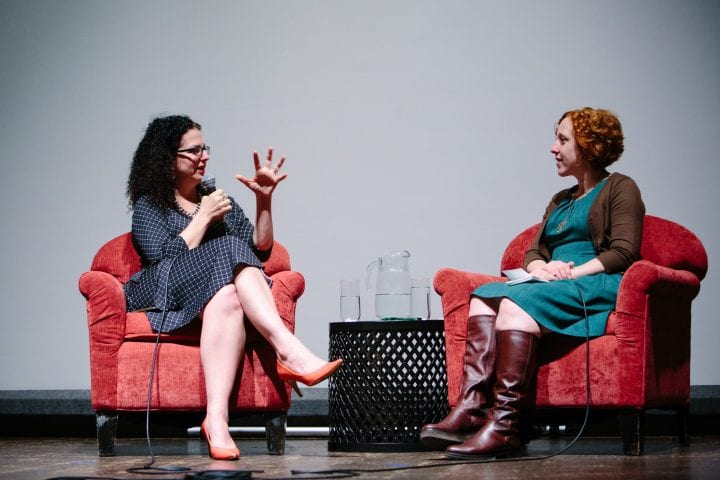
Creative Obsessions: Learning from Emily Nussbaum’s Critical Mantras
May 11, 2017
By Erin Langner
The first review I ever wrote was of the soundtrack for Baz Luhrmann’s Romeo + Juliet. It was for Jefferson Junior High School’s Patriot newspaper in 1997. To say I was obsessed with the movie is a dramatic understatement. It’s still the only film I’ve seen in the theater three times. The soundtrack CD was bright orange and printed with a stylized Virgin Mary that I was proud to have recognized from the handle of the 9 mm pistol that Tybalt carried in the movie—a movie that my thirteen-year-old self thought remade Shakespeare for my generation so well that I wanted to convince everyone I knew of my revelation.
Reviewing the soundtrack that contained staples from the 90s “new alternative rock” scene like Garbage and the Butthole Surfers in the school paper seemed like an avenue to relay my obsession to the masses and convince others of the resonance I’d felt so profoundly. I don’t remember much about writing it, other than how by the time the paper went to press on the Xerox machine, my CD had developed a ring of crust in its center; I’d listened to it so many times, it started to melt inside my boombox.
I thought of this desire to use a review as an outlet for my burning junior high school passion when The New Yorker’s television critic Emily Nussbaum took the stage at Town Hall last week for SAL’s Women You Need to Know Series and began by explaining her obsession with Buffy the Vampire Slayer. As she described her compulsion to convince people of the show’s merit at cocktail parties in Manhattan, I saw myself back in junior high school, hoping to show my fellow seventh graders how Romeo + Juliet was about so much more than just watching Leonardo DiCaprio try to kiss Claire Danes through a fish tank.
Even though the wonders of the Internet were still foreign to most people I knew in middle school, I already was skeptical that anyone read the school paper other than teachers. This made it shocking when a few classmates that I barely knew complimented me on the review unprompted. Although I don’t recall anyone sharing the same enthusiasm for the movie’s life-changing level of genius that I experienced, I remember people liking what I had to say about Shirley Manson’s vocals and that this was satisfying because a part of me saw the way I turned my obsession into something that other people wanted to read.
I don’t know very much about Buffy the Vampire Slayer and barely watch any TV by someone like Nussbaum’s standards. But, I related to the “mantras” she identified as motiving her criticism, such as a desire to “expand the critical television conversation to acknowledge the medium’s ambition” and to know down the hierarchy that ranks movies and literature as higher art forms more worthy of critical discussion. As someone who now reviews visual art regularly, I find myself motivated by similar internal ideals, though I’m in the opposite predicament; I find myself trying to convince mainstream audiences that visual art isn’t so elitist of a form that it has no place in people’s daily lives.
Nussbaum’s passion for the medium was evident from the thorough history of television that grounded her talk, but it was most obvious to me when it radiated through even the smallest passing comments she made, often in rapid-fire succession, on everything from I Love Lucy to Diff’rent Strokes to The Sopranos. Her incredible level of knowledge on so many shows made it seem like she spent an impossible amount of time watching television, even as someone whose full-time job is to do exactly that. But I also realized most people would probably find the amount of visual art I see in a year to be absurd, and it’s not even my full-time job. Knowing and then dissecting a provocative subject takes time, not to mention the support of substantial publication space. While full-time critics for daily newspapers and regular publications like The New Yorker have become increasingly rare, I know my life wouldn’t be the same without the insights of thoughtful writing like Nussbaum’s to inspire me to turn my obsessions into something more.
Erin Langner is a writer based in Seattle. Her work has appeared in Hyperallergic, Eleven Eleven, The Stranger, and Entropy. She is at work on a collection of personal essays inspired by her experiences visiting the Las Vegas Strip over the last decade. She is also the Program and Events Manager at the University of Washington’s Simpson Center for the Humanities.